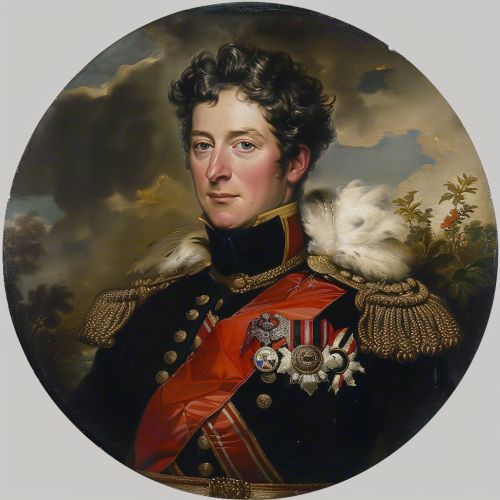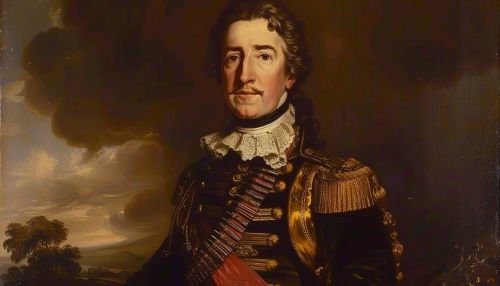Robert Devereux, 4th Earl of Essex: Difference between revisions
(Created page with "== Early Life and Background == Robert Devereux, 4th Earl of Essex, was born on January 22, 1591, into one of the most prominent families in England. He was the son of Robert Devereux, 2nd Earl of Essex, and Frances Walsingham, the daughter of Sir Francis Walsingham, who was the principal secretary to Queen Elizabeth I. The Devereux family had a significant influence in the political and military spheres of Elizabethan England. His father, the 2nd Earl of Essex, was a fa...") |
No edit summary |
||
| (One intermediate revision by the same user not shown) | |||
| Line 19: | Line 19: | ||
Devereux's legacy is complex. He is remembered as a dedicated but flawed military leader and a principled yet sometimes ineffective politician. His contributions to the Parliamentary cause during the English Civil War were significant, but his cautious approach and political disagreements limited his overall impact. | Devereux's legacy is complex. He is remembered as a dedicated but flawed military leader and a principled yet sometimes ineffective politician. His contributions to the Parliamentary cause during the English Civil War were significant, but his cautious approach and political disagreements limited his overall impact. | ||
[[Image:Detail-97007.jpg|thumb|center|Portrait of Robert Devereux, 4th Earl of Essex, in military attire.|class=only_on_mobile]] | |||
[[Image:Detail-97008.jpg|thumb|center|Portrait of Robert Devereux, 4th Earl of Essex, in military attire.|class=only_on_desktop]] | |||
== Later Years and Death == | == Later Years and Death == | ||
Latest revision as of 20:12, 15 July 2024
Early Life and Background
Robert Devereux, 4th Earl of Essex, was born on January 22, 1591, into one of the most prominent families in England. He was the son of Robert Devereux, 2nd Earl of Essex, and Frances Walsingham, the daughter of Sir Francis Walsingham, who was the principal secretary to Queen Elizabeth I. The Devereux family had a significant influence in the political and military spheres of Elizabethan England. His father, the 2nd Earl of Essex, was a favorite of Queen Elizabeth I but fell from grace and was executed for treason in 1601.
Education and Early Career
Robert Devereux received an education befitting his noble status. He attended Eton College, one of the most prestigious schools in England, and later matriculated at Merton College, Oxford. His education was comprehensive, covering classical studies, languages, and the arts of war and governance. After completing his education, Devereux embarked on the traditional Grand Tour of Europe, which was customary for young nobles of his time to gain cultural and political insights.
Military Career
Devereux's military career began in earnest during the Thirty Years' War, a protracted and complex conflict that engulfed much of Europe from 1618 to 1648. He served under the command of Sir Horace Vere in the Palatinate campaign. His military acumen and leadership skills were soon recognized, and he rose through the ranks. Devereux's most notable military engagement was during the English Civil War, where he aligned with the Parliamentarians against King Charles I.
Role in the English Civil War
As a prominent member of the Parliamentarian faction, Devereux was appointed as the Captain-General of the Parliamentary army. He played a crucial role in several key battles, including the Battle of Edgehill in 1642 and the Battle of Marston Moor in 1644. Despite his efforts, Devereux faced criticism for his cautious tactics and occasional indecisiveness. His relationship with other Parliamentarian leaders, such as Oliver Cromwell, was strained, leading to political and military friction.
Political Involvement
Beyond his military endeavors, Devereux was deeply involved in the political machinations of his time. He was a member of the Long Parliament and actively participated in the debates and decisions that shaped the course of the English Civil War. Devereux was a staunch advocate for constitutional monarchy and sought to limit the powers of the king while maintaining a balanced government. His political stance often put him at odds with more radical elements within the Parliamentarian faction.
Personal Life and Legacy
Robert Devereux married Frances Howard, the daughter of the Earl of Suffolk, in 1606. The marriage was tumultuous and ended in scandal when Frances sought an annulment to marry Robert Carr, a favorite of King James I. The annulment and subsequent remarriage were mired in controversy and intrigue, significantly affecting Devereux's personal and public life.
Devereux's legacy is complex. He is remembered as a dedicated but flawed military leader and a principled yet sometimes ineffective politician. His contributions to the Parliamentary cause during the English Civil War were significant, but his cautious approach and political disagreements limited his overall impact.


Later Years and Death
After the conclusion of the English Civil War, Devereux's influence waned. He retired from public life and focused on managing his estates. He remained a respected figure among his peers but did not play a significant role in the subsequent political developments, including the establishment of the Commonwealth under Oliver Cromwell. Robert Devereux, 4th Earl of Essex, died on September 14, 1646, and was buried in Westminster Abbey.
